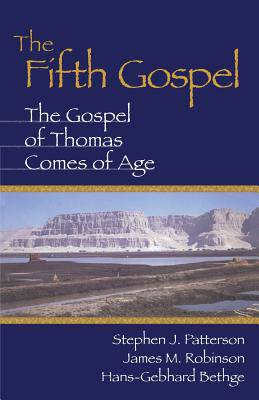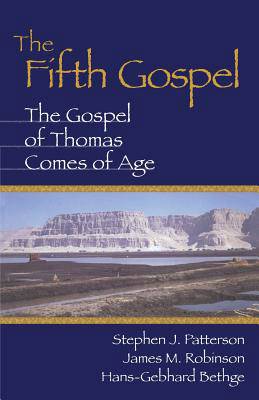
- Retrait gratuit dans votre magasin Club
- 7.000.000 titres dans notre catalogue
- Payer en toute sécurité
- Toujours un magasin près de chez vous
- Retrait gratuit dans votre magasin Club
- 7.000.0000 titres dans notre catalogue
- Payer en toute sécurité
- Toujours un magasin près de chez vous
Fifth Gospel
The Gospel of Thomas Comes of Age
Stephen J Patterson, Hans-Gebhard Bethge, James M Robinson
Livre broché | Anglais
62,95 €
+ 125 points
Description
"In December 1945, at the base of cliffs that run along the Nile River near the modern-day town of Nag Hammadi, an Egyptian farmer discovered, in a sealed jar, thirteen ancient Coptic codices containing more than fifty separate tracts. This discovery represented arguably the most significant manuscript discovery of the twentieth century for the study of the New Testament and Christian origins. Of all the texts in this Nag Hammadi Library, none has been more celebrated than the Gospel of Thomas--a Gospel that has played a crucial role in the newly emerging view of early Christianity as a very diverse phenomenon and in the recent revival of historical Jesus studies. Now, after more than fifty years of study, the best text and the best translation of Thomas are presented here in user-friendly form by the Berlin Working Group for Coptic Gnostic Writings, with Stephen J. Patterson and James M. Robinson. In addition, two essays have been included for persons who may be unfamiliar with this new Gospel or with events that led to its discovery and publication. The first, by Patterson, is a general introduction to the Gospel of Thomas as it appears fifty years after its discovery. The second, by Robinson, tells the fascinating story of that discovery itself by one who was directly involved in bringing this new Gospel to light. An annotated list ""for further reading"" completes the volume. Stephen J. Patterson is Associate Professor of New Testament at Eden Theological Seminary and author of The God of Jesus: The Historical Jesus and the Search for Meaning (Trinity Press). James M. Robinson is the former director of the Institute for Antiquity and Christianity, Professor Emeritus at The Claremont Graduate School, and editor of The Nag Hammadi Library."
Spécifications
Parties prenantes
- Auteur(s) :
- Editeur:
Contenu
- Nombre de pages :
- 128
- Langue:
- Anglais
Caractéristiques
- EAN:
- 9781563382499
- Date de parution :
- 01-11-98
- Format:
- Livre broché
- Format numérique:
- Trade paperback (VS)
- Dimensions :
- 140 mm x 216 mm
- Poids :
- 181 g

Les avis
Nous publions uniquement les avis qui respectent les conditions requises. Consultez nos conditions pour les avis.






